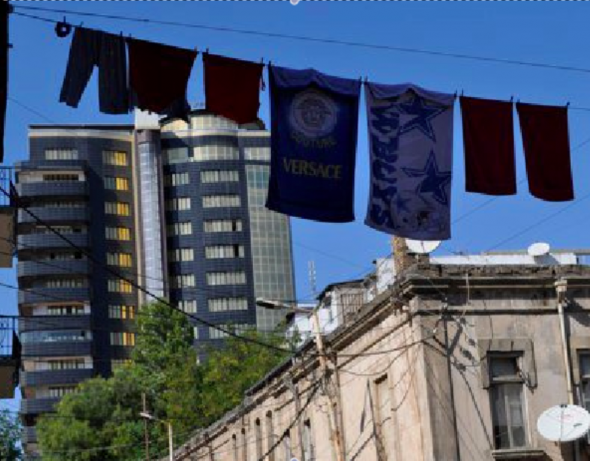
Shaurma No. 1 is not for girls. At least, it’s not for the kind of girl who wanders in in a tank top at 7:30 in the morning because she can’t find an Internet cafe with Skype.
In my first week living in Baku, I made daily journeys out and around town in hope of finding a computer I could use to call my parents. In a city dotted with Internet cafes with alleged 24-hour service, I didn’t think this would be a problem. The biggest hurdle, I thought, was the nine-hour time difference.
But as I started to set up phone dates, I discovered there was a lot I didn’t know about Baku. For example, 24/7 (or, as it was more often written, 24/24) means something more like “we’ll open our doors pretty early, around 10 or so, unless our owner isn’t up to it, in which case we’ll probably stay closed all day.”
I also learned that most Internet cafés aren’t places for women, and computers are set up for video games, not international phone calls.
And though the official language of Azerbaijan is Azeri, which shares an alphabet with English, many people in this former Soviet Republic still communicate in Russian. And I, with the computer savvy of a seven-year-old and the language skills of a mute, could not figure out how to change the characters from Cyrillic to Roman.
One morning, I spent a half-hour painstakingly cutting and pasting the letters I needed from web pages to sign into my email, only to find that the computer did not have a microphone.
I was tired, frustrated and lonely. I stumbled back onto the street and sat down at the first place I could find. Shaurma No. 1, a dusty little outdoor cafe that specializes in chicken sandwiches that they fold up into lavash bread and smother in mayonnaise and “frees” (fries). But as I sat down at a picnic table under a tent, I could only muster the energy to order tea.
Shaurma No. 1 often has more waiters than guests, and no fewer than four men swung by to speak to me in very broken English. Why was I sad, they wanted to know. Why was I up so early? Why was I alone?
I tried my best to explain my situation in pantomime. I had flown from Am-er-ic-a, I said slowly, spreading my arms like an airplane. I lived here, I said, pointing at the ground and then across the street, at my apartment building. I want to call home (hand up like a phone) but Internet cafes (type, type, type on my imaginary keyboard) were yokder.
He looked confused, so I started again. One more time, and he understood. He called someone who called someone. The café next door was opened. The tea was on the house. I called home. It was, it seemed at the time, a miracle.
I haven’t traveled all that much, but I’ve been enough places to know there’s a certain magic to going somewhere new. Travel is full of the unexpected, of these tiny little moments in which it seems like things will never work out and then somehow, inexplicably, fate gives you a little wink and they do.
Once, when I was sitting in traffic in a Colombian bus, the man sitting behind us asked if we’d like him to take us through a lush canopy of mangrove trees in his canoe. In New York, the prospect of hopping into a boat with a total stranger would seem beyond irrational. Here, we got in, paddled over to an island, and ate a fish our new friend had caught that morning and let us pick out of a bucket. He cooked it while we swam, alone, on a pristine beach.
In Cairo, a Bedouin man began chatting me up as I was walking to the Egyptian Museum. We ended up wandering to his neighborhood to buy the best falafel I’ve ever tasted. He then dropped me off at the pyramids, where I bought myself a rather expensive camel ride. When I couldn’t get my ATM card to work on that same trip, a pair of men (who, at first glance, appeared a tiny bit thuggish) drove me around the city in search of a working machine. When we couldn’t find one, they told me to come back and pay whenever. I came back that afternoon, and they had prepared elaborate dishes of chicken and potatoes for me. Afterward, they loaned me one of their horses for a sunset ride through the desert.
These are the kind of stories I’ve come to expect, adventures that make for good faux nonchalant retelling (and retelling and retelling) when friends ask, “How was your trip?”
But in Azerbaijan, where I moved to live rather than visit, that traveler’s high has begun to wear off. It’s been replaced, slowly, by a sense of belonging to a place, somewhere where some days are good and some days, things go horribly, horribly wrong. I’ve become less reliant on serendipity to get me through the day. I now know which Internet cafes will be open at 7:30 a.m., and which computers will let me Skype. I’ve learned how to change a computer’s language settings from RUS to ENG.
I still go to Shaurma No. 1 at least once a week, mostly just to drink chai and gaze out onto this city I’ve started to call home. It no longer seems strange that an American girl is sitting and drinking a pot of chai among the Azeri men talking and playing nard. The waiters know what I want before I place my order, and they always bring me a bill along with a smile.
I am, at long last, a regular.
Amanda Erickson is a journalist and Fulbright Scholar in Baku, Azerbaijan.
*Photo by Amanda Erickson.




Send A Letter To the Editors